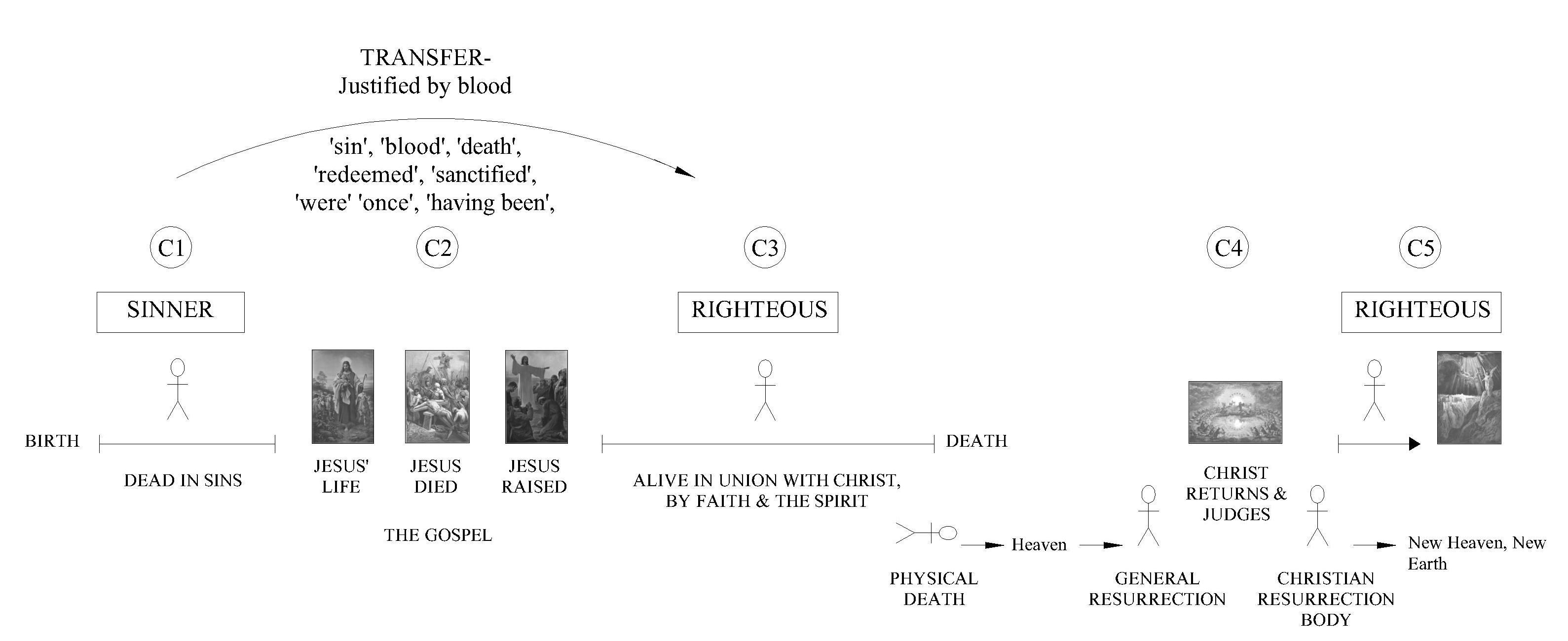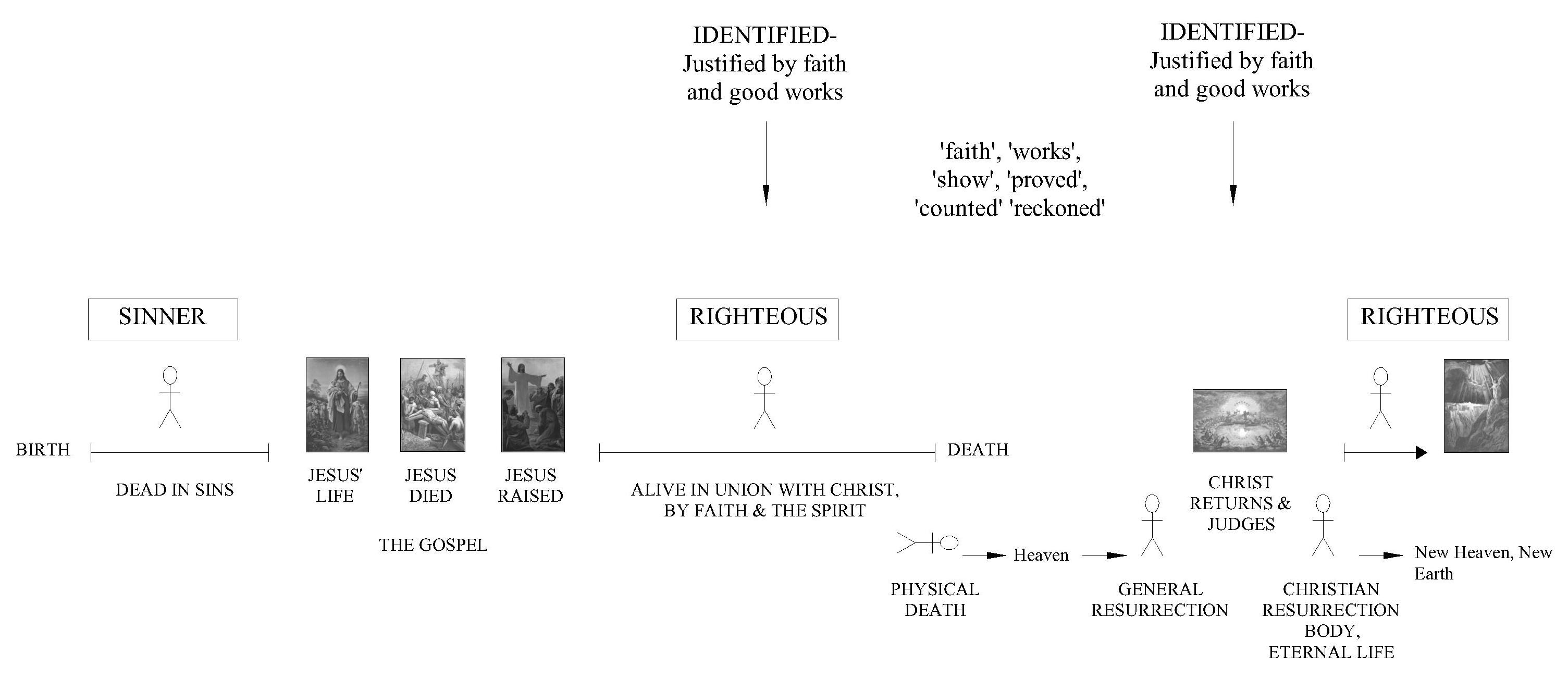
In this post I look at justification outside of Paul’s writings. What everyone else says about justification. I use this in part to give an understanding of Paul’s contemporaries. How everyone else used and employed justification language. And then fit Paul within this context.
This is the eighth of a series of posts on the concept of righteousness and justification in the scriptures. I’ve listed most (if not all) references to right, righteous, righteousness and just, justified and justification in the scriptures to do my own study on what the scriptures say about the concept.
Click on this link to go to the first post which has a summary and links to all.
Contents
After reading through the varied instances of justified and justification in the scriptures I have attempted to categorize each depending on what the immediate context shows and my own categories of thought.
In this post I will do my best step through a series of passages which mention justification and highlight elements in them which explain why I have developed these categories.
Assumptions
From the posts we have looked at so far in this series I’ve assumed that each of these passages operates under the same understanding there are distinct kinds of people. Those who are called ‘sinners’, the ‘wicked’, ‘transgressors’ who behave as their name suggests. And those who are called ‘the righteous’. Righteous people who behave as their name suggests. This understanding of different groups of people seems to run all the way through the scriptures.
Sinners become righteous
Old Testament (Job 33.23-33; Isa 53.7-12)
Elihu is speaking to Job.
23 If there be for him an angel, a mediator, one of the thousand, to declare to man what is RIGHT for him,
24 and he is merciful to him, and says, ‘Deliver him from going down into the pit; I have found a ransom;
25 let his flesh become fresh with youth; let him return to the days of his youthful vigor’;
26 then man prays to God, and he accepts him; he sees his face with a shout of joy, and he restores to man his RIGHTEOUSNESS.
27 He sings before men and says: ‘I sinned and perverted what was RIGHT, and it was not repaid to me.
28 He has redeemed my soul from going down into the pit, and my life shall look upon the light.’
29 “Behold, God does all these things, twice, three times, with a man,
30 to bring back his soul from the pit, that he may be lighted with the light of life.
31 Pay attention, O Job, listen to me; be silent, and I will speak.
32 If you have any words, answer me; speak, for I desire to JUSTIFY you.
33 If not, listen to me; be silent, and I will teach you wisdom.” (Job 33.23-33)
The mediator declares to a man what is right. Presumably he corrects the sinner in the wrong he was doing and tells him of what is right. There is debt to be paid for his sin. The mediator pays a ransom for the sinner and prays to God for his acceptance. Otherwise the sinner would have had to go down into the pit. That is, die. The man is restored to full health (quite appropriate for Job in this situation) and restored to his righteousness. Presumably his right standing in the community and before God. This process is what Elihu associates with his desire to justify him (v32).
What I think is key here for justification is that the man is moved from a state of sin to one of righteousness. The declaration of what is right, the payment of a ransom and the redemption of the sinner are core elements of this event. The imagery used is the slave market.
Now Isaiah speaks of the suffering servant. This is one of the servant songs. I’ve posted on it here.
7 He was oppressed, and he was afflicted, yet he opened not his mouth; like a lamb that is led to the slaughter, and like a sheep that before its shearers is silent, so he opened not his mouth.
8 By oppression and judgment he was taken away; and as for his generation, who considered that he was cut off out of the land of the living, stricken for the transgression of my people?
9 And they made his grave with the wicked and with a rich man in his death, although he had done no violence, and there was no deceit in his mouth.
10 Yet it was the will of the Lord to crush him; he has put him to grief; when his soul makes an offering for guilt, he shall see his offspring; he shall prolong his days; the will of the Lord shall prosper in his hand.
11 Out of the anguish of his soul he shall see and be satisfied; by his knowledge shall the RIGHTEOUS one, my servant, make many to be accounted RIGHTEOUS, and he shall bear their iniquities.
12 Therefore I will divide him a portion with the many, and he shall divide the spoil with the strong, because he poured out his soul to death and was numbered with the transgressors; yet he bore the sin of many, and makes intercession for the transgressors. (Isa 53.7-12)
The servant is described as righteous (v11). He is instrumental in bringing about the will of the LORD (v10). The servant is a lamb, a sheep, a sacrificial offering. His soul is anguished and makes an offering for guilt (v10,11). He bears the sin and iniquities of many (v11,12). As a result of his sacrifice he shall see his offspring (v10). When he sees them he shall be satisfied (v11). Because his many offspring are accounted righteous (v11). I’ve assumed being accounted righteous is synonymous with being justified.
What I think is key here for justification is the movement from a state of sin (transgressors) to one of righteousness (accounted righteous, offspring). The guilt offering of the servant. His bearing of the sin and iniquities are core elements of this event. The imagery used is temple sacrifice.
New Testament (Lk 18.14; Acts 13.39)
In the gospel, Jesus tells a parable. I’ve posted on it here.
9 He also told this parable to some who trusted in themselves that they were RIGHTEOUS, and treated others with contempt: 10 “Two men went up into the temple to pray, one a Pharisee and the other a tax collector.
11 The Pharisee, standing by himself, prayed thus: ‘God, I thank you that I am not like other men, extortioners, unjust, adulterers, or even like this tax collector. 12 I fast twice a week; I give tithes of all that I get.’
13 But the tax collector, standing far off, would not even lift up his eyes to heaven, but beat his breast, saying, ‘God, be merciful to me, a sinner!’ 14 I tell you, this man went down to his house JUSTIFIED, rather than the other. For everyone who exalts himself will be humbled, but the one who humbles himself will be exalted.” (Lk 18.9-14)
The setting is the temple where the Jews prayed to God and sacrifices for their sins.
The delusional Pharisee trusts in himself that he is righteous (v9-12). The expression puts his character in central focus. But it does carry with it the interrelated connotations we have been looking at (especially the God and His People and Ethical Standards posts of this series).
The Tax Collector humbles himself and prays for mercy because he is a sinner (v13). We are not told if he offered a sacrifice for his sin, that may be the case, but it’s not important. He goes to his house justified and exalted (v14). The proximate reference to being ‘righteous’ in v9 may suggest being justified made him ‘righteous’ as the delusional Pharisee thought of himself.
What I think is key here for justification is the movement from a state of sin (sinner requiring mercy) to one of righteousness (justified, exalted). The important elements are his confession, humble plea for mercy with the possibility of a sacrifice for his sin (he is in the temple after all). The setting is the temple and we can assume sacrifice.
36 For David, after he had served the purpose of God in his own generation, fell asleep and was laid with his fathers and saw corruption, 37 but he whom God raised up did not see corruption. 38 Let it be known to you therefore, brothers, that through this man forgiveness of sins is proclaimed to you, 39 and by him everyone who believes is freed from everything from which you could not be freed by the law of Moses. 40 Beware, therefore, lest what is said in the Prophets should come about:
41 “‘Look, you scoffers, be astounded and perish; for I am doing a work in your days, a work that you will not believe, even if one tells it to you.’ ” (Acts 13.36-41)
Paul is preaching, but Acts is written by Luke, which is why I have included this passage here. Paul is preaching the gospel. He first tells the story of Israel and shows how it is fulfilled in the story of Jesus resulting in salvation for those who believe.
The aspect of salvation he refers to is being ‘freed from everything the law of Moses was unable to free them from’ (v39). The underlying Greek rendered as freed is ‘dikaioutai’. Also ‘justified’. Justification is depicted here as release from corruption and sin.
What I think is key here for justification is the movement from a state of sin (corruption, captivity to some form of depravity) to one of righteousness (freedom, perhaps purity or holiness). The imagery employed is slave market.
Summary – Sinners become righteous
In each of these passages people are in some way depicted in a state of sin. The event of justification moves them from the state of sin into one of righteousness and holiness.

The various imagery associated with justification is;
- Slave market – Ransom (Job 33.23-33; Acts 13.36-41),
- Temple Sacrifice – Guilt offering, temple (Isa 53.7-12, Lk 18.9-14)
The righteous identified as righteous
Old Testament (Pr 17.15; Ps 106.31; Isa 45.25)
Proverbs jumps around a bit, the verse were interested in is Pr 17.15, but I’ve added the verses before and after to show they have little relevance.
14 The beginning of strife is like letting out water, so quit before the quarrel breaks out.
15 He who JUSTIFIES the wicked and he who condemns the RIGHTEOUS are both alike an abomination to the LORD.
16 Why should a fool have money in his hand to buy wisdom when he has no sense? (Pr 17.14-16; cf. Pr 24.24; Ex 23.7; Isa 5.23)
‘Wicked’, ‘Righteous’. The author refers to two kinds of people with different types of character. The wicked and the righteous. The author describes people who justify the wicked and condemn the righteous as abominations to the LORD. Clearly the LORD himself would never do this. These abominations should have done it the other way. The wicked should be condemned and the righteous, justified.
Justification here is the opposite of condemnation and the imagery is easily applied to the law court. The person is doing something when they justify and condemn others. But, it is important to realise the person is not being changed. Rather justification is showing or proving the person to be right.
We jump back into the Torah before Israel has reached the promised land. Sadly Israel was involved in idolatry and sexual immorality. But, a man named Phinehas put an end to it and consequently stopped the plague the LORD had sent as punishment. The incident is described in Psalm 106.
28 Then they yoked themselves to the Baal of Peor, and ate sacrifices offered to the dead;
29 they provoked the Lord to anger with their deeds, and a plague broke out among them.
30 Then Phinehas stood up and intervened, and the plague was stayed.
31 And that was counted to him as RIGHTEOUSNESS from generation to generation forever. (Ps 106.28-31)
‘That was counted to him’. The author refers to Phinehas’ actions in ‘standing up and intervening’ which stayed the plague. These are good things and they are counted to him as righteousness (v31). Phinehas’ is not viewed here as a sinner. Rather it’s more probable he is a righteous man and his actions are commended as righteous. That is, he and his actions are shown to be right. This will have an ongoing effect for all his generations following him.
The whole story is in Num 25 and here we learn more.
10 And the Lord said to Moses, 11 “Phinehas the son of Eleazar, son of Aaron the priest, has turned back my wrath from the people of Israel, in that he was jealous with my jealousy among them, so that I did not consume the people of Israel in my jealousy. 12 Therefore say, ‘Behold, I give to him my covenant of peace, 13 and it shall be to him and to this descendants after him the covenant of a perpetual priesthood, because he was jealous for his God and made atonement for the people of Israel.’ ” (Num 25.10-13)
Phinehas is rewarded with a covenant of peace (v12). The following passage in Numbers associates the counting of righteousness with a covenant blessing.
In Isaiah, Israel is again implicated in idolatry.
20 “Assemble yourselves and come; draw near together, you survivors of the nations! They have no knowledge who carry about their wooden idols, and keep on praying to a god that cannot save.
21 Declare and present your case; let them take counsel together! Who told this long ago? Who declared it of old? Was it not I, the Lord? And there is no other god besides me, a RIGHTEOUS God and a Savior; there is none besides me.
22 “Turn to me and be saved, hall the ends of the earth! For I am God, and there is no other.
23 By myself I have sworn; from my mouth has gone out in RIGHTEOUSNESS a word that shall not return: ‘To me every knee shall bow, every tongue shall swear allegiance.’
24 “Only in the Lord, it shall be said of me, are RIGHTEOUSNESS and strength; to him shall come and be ashamed all who were incensed against him.
25 In the Lord all the offspring of Israel shall be JUSTIFIED and shall glory.” (Isa 45.20-25)
I feel this passage could go either way. Israel is certainly depicted as sinful and the LORD is calling sinful Israel to repent (turn to him) and be saved. So there is a movement from sin to something positive.
But in Isa 45.24-25 the prophet seems to be speaking of those who are ‘in the LORD’ (v24,25). The movement from sin to the positive has completed. It is in this new state ‘Israel shall be justified and shall glory’ (v25). Only in the LORD are ‘righteousness and strength’ (v24). In the LORD Israel is shown or proved to be right.
New Testament (Mt 11.19; 12.36-37; Jas 2.21-25; cf. Lk 7.35)
In the gospel, Jesus and his ministry was questioned.
18 For John came neither eating nor drinking, and they say, ‘He has a demon.’ 19 The Son of Man came eating and drinking, and they say, ‘Look at him! A glutton and a drunkard, a friend of tax collectors and sinners!’ Yet wisdom is JUSTIFIED by her deeds.” (Mt 11.18-19; cf. Lk 7.33-35)
Jesus ministry to tax collectors and sinners is questioned. He refers to his ministry as ‘wisdom’ (v19) which is bearing fruit. ‘Wisdom’ is justified by her deeds or works. Here justification is showing or proving something to be right. In this case by works.
33 “Either make the tree good and its fruit good, or make the tree bad and its fruit bad, for the tree is known by its fruit. 34 You brood of vipers! How can you speak good, when you are evil? For out of the abundance of the heart the mouth speaks. 35 The good person out of his good treasure brings forth good, and the evil person out of his evil treasure brings forth evil. 36 I tell you, son the day of judgment people will give account for every careless word they speak, 37 for by your words you will be JUSTIFIED, and by your words you will be CONDEMNED.” (Mt 12.33-37)
Jesus contrasts good trees with bad trees. Good trees bear good fruit. Bad trees bear bad fruit. He is speaking about people and what will happen in the day of judgment. He says by their words people are justified and condemned. This is similar to the justification by deeds passage we just looked at. In the day of judgment people will be shown or proven to be righteous (good tree) or wicked (bad tree) because of what they say (good or bad fruit).
21 Was not Abraham our father JUSTIFIED by works when he offered up his son Isaac on the altar? 22 You see that faith was active along with his works, and faith was completed by his works;
23 and the Scripture was fulfilled that says, “Abraham believed God, and it was counted to him as RIGHTEOUSNESS”—and he was called a friend of God.
24 You see that a person is JUSTIFIED by works and not by faith alone. 25 And in the same way was not also Rahab the prostitute JUSTIFIED by works when she received the messengers and sent them out by another way? (Jas 2.21-25)
I’ve posted on this passage before. The repeated references to justification by works are all instances of showing or proving a person is righteous by their works. The way they behave.
Summary – The righteous identified as righteous
In each of these passages people or their ministry are in some way depicted as righteous. Justification by words, deeds and works all serve to show or prove the person or ministry is right.

Copyright © Joshua Washington and thescripturesays, 2017. All Rights Reserved.

